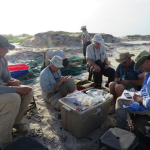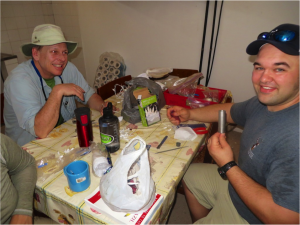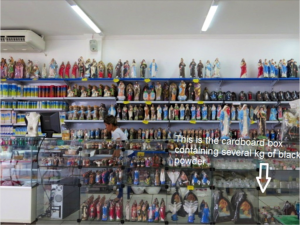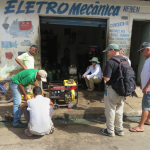Update from Brazil #2: Down to Work
CWF’s Larry Niles and his colleagues are on a two-week trip to northern Brazil to trap and band Red Knots, Ruddy Turnstones, and other shorebirds on their wintering grounds. We’ll be posting summaries of his blog entries as he reports from the field.

Cannon netting in a remote place increases the odds of failure, and cannon netting in Brazil may be the most difficult of all. For one thing, cannon netting requires an enormous amount of equipment not easily available in places like northern Brazil. Take covering material, the opaque cloth that is widely available in the US to shade hothouses. We use it to shade the birds caught under a net to protect them from the sun and to calm them. After visiting many stores, we found something similar in São Luís, not equal to the need, but sufficiently suitable to be useful.

But for the igniters we use to fire the cannons, it’s a much different story. Even in the United States, the authorities tightly control their use for obvious reasons. Igniters are what miners use to blow up rock, and thus potentially dangerous in the wrong hands. As far as we know, they cannot be found in Brazil, and we can’t even receive them if we sent them from the US. Only a government official can do that, and our colleagues in Brazil were unable to get permission to do it.
We overcame this nearly insurmountable difficulty by going to the Internet. We soon learned how to create an igniter with small Christmas tree lights. Cut the glass top off of the light and charge with a minor electric current, and they pop like the real thing.
Worse yet is gunpowder. We use it to fire the projectiles that carry the net over the birds. Without it, we have no expedition. But in the South American countries in which we have worked, the authorities tightly control gunpowder. Here in Brazil you need a license, and forget about getting one if you are from the United States.

But we persisted, and after a bit of investigation, we learned that Brazilians use black powder in religious ceremonies. We would eventually find powder in, of all places, a religious goods store with a mix of religious iconography impossible to find in the US. Think Blessed Virgin Mary meets voodoo goat head devil god. As if blessed by the Holy Mother, we found all the powder we needed just beneath her benevolent and loving image.

In other words, to be successful in a cannon netting expedition, one must be resourceful. Ultimately it depends on two things: the team and the people in country that help you. This year in Brazil we are fortunate on both counts. Our Brazilian colleague, Ana Paula Sousa, is from the Universidad Federal de Maranhão and lives in São José de Ribamar, only five miles from our field station. We work under her banding permit and with her professor, Dr. Augusto Rodrigues. It was her that provided us with the field station we call home.
Ana’s generous nature comes naturally. Her father and mother Omar and Diva Sousa have been vital to overcoming the minor obstacles that seem to arise everyday when running an expedition in a rural area, from fixing the cranky generator and well pump to finding hard to find supplies like net-mending line and block ice. All this, and yet Mr. and Mrs. Sousa refuse our offers of compensation for their time. They do it because of their pride for their daughter’s chosen vocation, the native spirit of generosity, and their own big hearts.
For the original blog entry, see Larry’s post Down to Work.
Stay tuned for further updates!
Discover more from Conserve Wildlife Foundation of NJ
Subscribe to get the latest posts sent to your email.